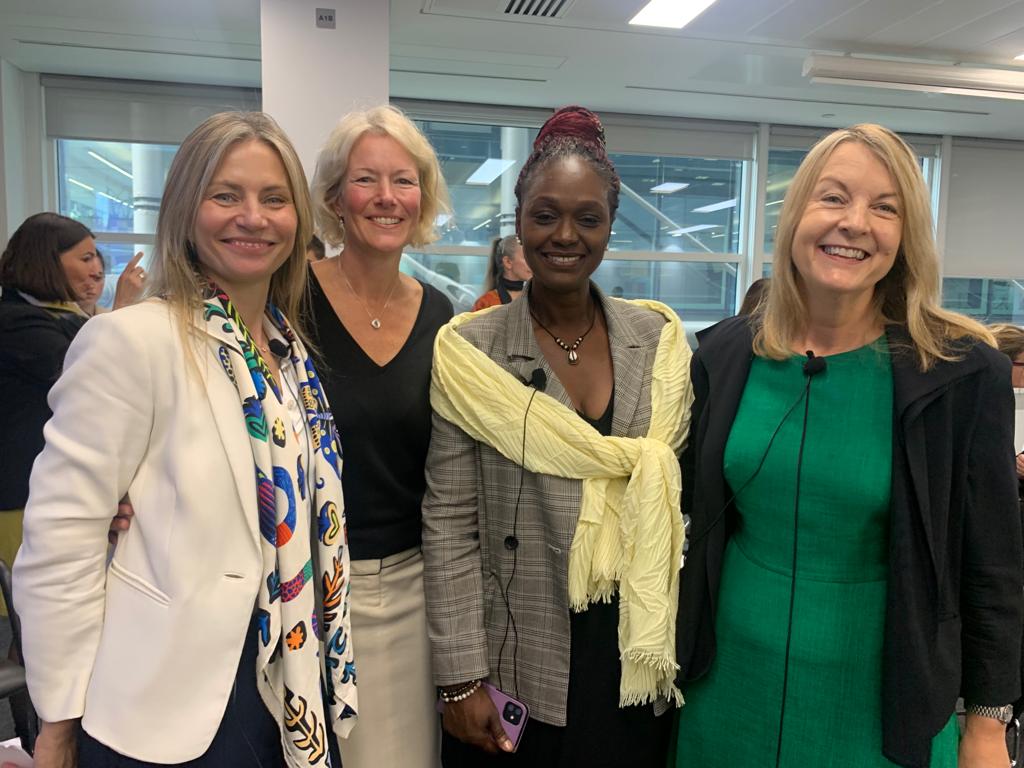
New ways of working and its impact on inclusion
news published date 5 October 2023Last week WIBF and the Diversity Project kicked off their new partnership with an inaugural event: New Ways of Working and its impact on Inclusion. We were hosted by our corporate partner, Natixis.
The relationship between WIBF and the Diversity project was spearheaded by Linda Russheim from the Diversity Project and Bev Brown from WIBF. You can read more about our partnership here.
Gareth Miller introduced the event sharing the Diversity Project’s Hybrid Working Guide designed to offer practical answers to some of the questions that have been raised by managers from a range of organisations across the industry.

The first panel was moderated by our very own Nicky King, she discussed the topic of “Developing and managing hybrid inclusion in an evolving environment” with her guests: Jenny Segal, Julianne Miles MBE, Dominie Moss, Charlene Sagoe Not only did the panel share personal experiences about hybrid working, as well as some advice to those working in a hybrid environment. In addition they shared some interesting data from the Hybrid Work Commission 2023, including that 75% of hybrid workers believe that hybrid working has had a positive impact on their work-life balance, and 33% of business owners felt that people worked better when working from home, whilst 32% stated that they felt working in the office was more productive, and the remaining 35% felt it made no difference.
The second panel ‘Flex – the forgotten element of SMART working’, included Alan Morahan, Debs Ingham, Emma Smith, Victoria Gobey, Katie S.. Devya Sharma discussed the opportunities and barriers to flexible working, how flexible working extends beyond hybrid working, and why employers should be offering a wider range of flexible working arrangements. We heard about a range of different working arrangements with their employers.

The final panel, ‘Demonstrating the value of flex working for the future of work’ featured Suzy Levy, Tim Kemp, Amy Butterworth, and was moderated by Steve Butler. The panel discussed the nature in which we create jobs and how we need to reshape the future of work, they also went on to discuss what ‘good practice’ looks like in terms of flexible working. Steve rounded the panel on an important question: what is the impact of flexible working outside of work?
In closing Homayoun (Homy) Dayani-Fard (ICF PCC) highlighted the importance of smart working, and its impact on productivity. There is no doubt that this is a complex task as each firm is different and it requires creative problem solving to suit individuals, teams and organisations .

And as the recent FCA and PRA proposal indicates, flexibility is at the heart of this. The proposed rules aim to see increased diversity and inclusion in firms translate into better internal governance, decision making and risk management. Furthermore, flexibility, as our ACT research shows, does not have a prescriptive definition. Rather there are multi dimensions, location or remote working is one, but there are other dimensions such as time (e.g. 9-5 vs flexing the hours), nature of the work (job sharing) etc.
The aim of the event was to:
Highlight the complexity of hybrid working and its potential unintended consequences
To showcase the many different ways of flexible working that your firms could consider
To demonstrate the benefits to you and your company of implementing flexible working
To show the value of flexible working in building more collaborative work environments as part of the future of work/new ways or working.
Thank you to our wonderful hosts Natixis, particularly Charlene Sago and Andrew Benton who opened the event. We look forward to sharing the recording of the event soon.
The Diversity Project have just launched a short survey to follow up on their Safe Space initiative, and would like to delve further into people’s reporting behaviours to try and understand the reasons why you may or may not report poor behaviour in the workplace. Note the survey is anonymous and you can complete it here,
